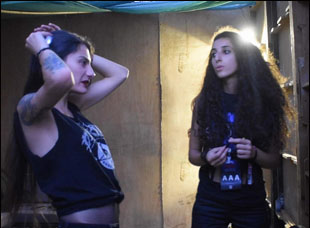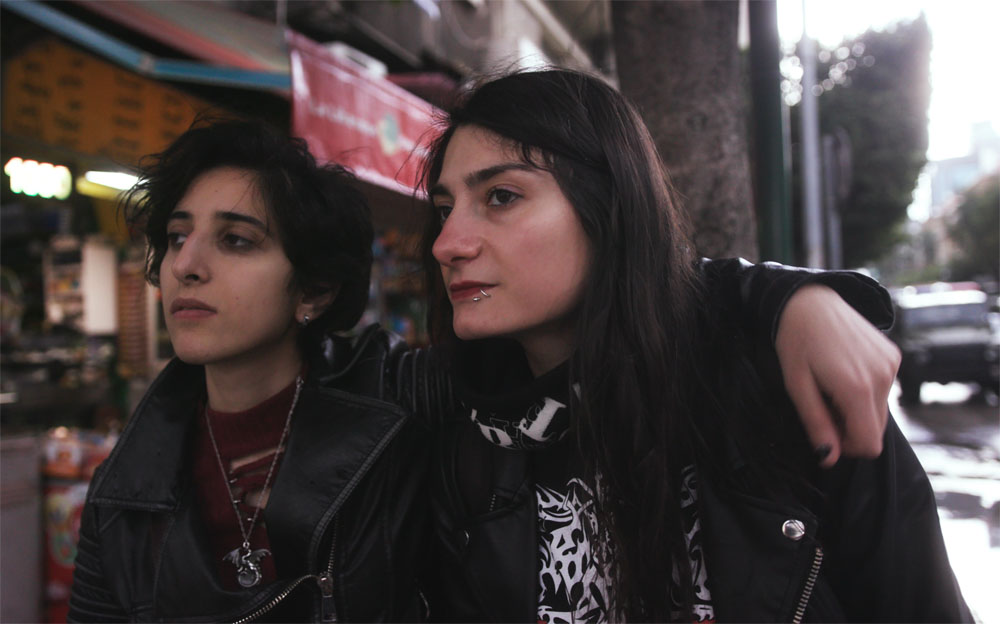“Music is the only form of expression we can agree on these days,” a newscaster can be heard saying during “Sirens,” as the Lebanese heavy metal act Slave to Sirens can be heard playing Led Zeppelin’s “Kashmir” with a host of other musicians assembled. Rocking out seems like one of the few reasonable ways to respond to the unrest that’s taken hold in the country where economic instability has led to protests in the streets, political upheaval and the threat of violence from nearby Syria that’s a constant threat to spill over the border and for the women in Slave to Sirens, picking up a guitar in and of itself is an act of rebellion, making music against any and all expectations society may have of them.
In Rita Baghdadi’s captivating doc, the fact Slave to Sirens play loud isn’t only to rise above the noise on their home turf, but likely more attuned to what they’re feeling as young adults still wanting to gain a handle on their own identity and a sense of belonging in a culture where it doesn’t feel like they fit in. When Lilas Mayassi and Shery Bechara started thrashing together, it would seem as though the two found a rhythm, both as friends and as bandmates, but as the act’s profile grows, both face increasing pressure outside the band that brings tension inside of it, particularly for Lilas, whose openness regarding her sexuality in a country where it is considered illegal still has her tradition-bound mother suggesting the possibility of an arranged marriage and grows alienated from the group when crowd size doesn’t seem commensurate to their level of success.
However, frustrations only add fuel to the fire for the group that put their daily lives to the side when they take the stage, seeing their only recourse as being bigger than life and Baghdadi is able to elevate their story to the size of their epic sound, following them over many years to chronicle their growth and the totality of what they’ve had to overcome to be the artists they aspire to be. Following the film’s premiere at Sundance earlier this year and a celebrated festival run including Outfest where it picked up a Grand Jury Prize over the summer, “Sirens” is set to blow the roof off theaters across the country with their speakers turned to 11 and Baghdadi and Mayassi spoke about collaborating on the film, the many unexpected moments along the way and finding the best way to capture the action.
Rita Baghdadi: I met Slave to Sirens really through their music in 2018. I was just searching around the internet for new music to listen to and they had just put out their EP, so I came across it, I was really blown away by their sound and I went and did a little bit of research and discovered they were the first all-metal band in the Middle East. I just saw a picture of them online and I was like, “I have to meet these young women.” So I messaged the band on Facebook and Lilas was the one to answer and we struck up a conversation and a relationship online for several months. I really had no idea [what I would film]. The only thing I really knew for certain was it would be about a band trying to make it under extraordinary circumstances.
Lilas, did you know what you and the band were getting yourself into with this?
Lilas Mayassi: Not really, not at all. [laughs] As Rita said, it was like…it was set to be maybe something short, maybe, a few minutes maybe. We had no idea it was going to take a long period of time and it’s a whole experience. We had no idea. We were just being ourselves and going with the flow. [And] it wasn’t easy to bring a camera into the personal space, but with the open communication between me and Rita and the safety that we established and the relationship we found, it got easier with time, so I didn’t feel like Rita was a stranger. With time, I felt she was more like a sister…
Rita Baghdadi: I think [Lilas] and I from the beginning, [and] always had a special relationship, so we were the closest.
Rita, that intimacy comes across in how you film and you seem to get the best of all possibilities with a wide lens where you can capture the band in full on stage, but feels intense in close-ups. What was it like figuring out how to frame this?
Rita Baghdadi: Going into it, I really didn’t know what I was walking into at first. [laughs] I felt I just needed to equip myself with something simple that I was familiar with, meaning I only brought two lenses and really only used one for the most part, but I knew that I wanted it to be intimate. I shot on an 18-35mm [lens], so when you’re at an 18mm and you want to be intimate, you have to stand this close to someone [putting her hand right next to her face], so I established that at the beginning [with everyone], like “this is what I want it to look like” and if it was ever uncomfortable, we would’ve changed horses. But the look became established from the beginning in how was everyone feeling and how is it actually working in the field as opposed in my mind, and at some point, it starts to take on a life of its own. Whatever preconceived notions about what it’s going to look like or what you set out to achieve, it takes its own path and you have to go with it.
In a story sense, is there anything that happens that changes your ideas of what this could be as you’re shooting?
Rita Baghdadi: Every time I filmed, it took a different direction. None of us knew the revolution was going to happen.
Lilas Mayassi: All the events!
Rita Baghdadi: And we didn’t know that the band was going to have an epic fight, and we didn’t know the explosion was going to happen. We didn’t know the girls were going to get invited to Glastonbury. That was the second shoot I went on and then the third shoot was Glastonbury, so we had to pivot every single time we went. That’s why I had to keep my team small, so we can be nimble.

Rita Baghdadi: The moment was really organic. I was actually late and I missed the real moment I thought I was going to capture, which was them meeting back up after a while because it was raining and there was a protest and there was all this chaos…
Lilas Mayassi: And I was partying all night.
Rita Baghdadi: [Lillas] had never been to sleep. So it was a little bit chaotic getting into that moment and I remember just standing there and filming them just chatting, not really having any plan for what we were going to capture and here Lilas is being very open about her night out and she’s excited about it and then all of a sudden, the protest comes up behind them. We never could’ve planned any of that. But that was towards the end of principal photography, so we had already captured a lot of the revolution, and we already had a plan we were going to incorporate the revolution into the film, but when that scene was shot, I remember thinking, “Now we have a film. Now we have a movie.” Because all of the themes came full circle in that one scene. When I captured that, I remember thinking, “Okay, I can finish this movie now.”
Did that feel true to you what Lebanon is like these days, Lilas?
Lilas Mayassi: Yeah, this is basically Lebanon since forever, so I’ve gotten used to the chaos. It’s just part of our daily lives. We wake up every day with something new happening. That’s what I was telling Rita when I got here is that every week, there is some kind of action in Lebanon going on, so there is no escape from the ongoing conflict. Unfortunately, it gets normalized and it shouldn’t be.
One of the things I realized the second time watching the film was how gracefully you interweave the music – I imagine it might’ve been tempting to score entirely with Slave to Sirens, but there’s a great counterbalance with this soothing synth music. How did the score come about?
Rita Baghdadi: We needed something that was going to speak to the other side of the girls, like the more coming-of-age story about being young women and finding yourself and not that their [own] music doesn’t speak to that, but it’s a very specific tone. When we were in the edit, I was playing around with temp music and I kept gravitating towards the soundtrack from “Girlhood,” Celine Sciamma’s film and there’s a lot of similar themes. That’s how I discovered Para One and I just loved his music. I contacted him and it took many months of trying to reach him because I think he was busy, and I thought “Okay, I’m not going to get him,” but at the last minute, he came through and really loved the film, so I got to work with him. It was just an amazing experience.
What’s it been like for you seeing this all come together?
Lilas Mayassi: It’s a beautiful, beautiful film and like I hope it inspires whoever watches it. I do get messages from time to time from people who get to see it and all the messages are really heartwarming and I see that it’s doing what it’s destined to do, which is inspire others, so I hope we continue on this path.
Rita Baghdadi: And it’s everything I set out to make and more because I could’ve never predicted what happened, but for me, the journey of making the film and getting close with Lilas and Chery and the rest of the band is the beauty. I feel I gained five new younger sisters and [with] the team that worked on the film, I feel like I’ve gained partners for life. All that to me really makes the journey worthwhile and like Lilas said, I hope the film just continues to inspire people.
“Sirens” is now open in New York at the Angelika Film Center and opens in Los Angeles at the Laemmle Royal before expanding across the country on October 14th. A full list of theaters is here.





